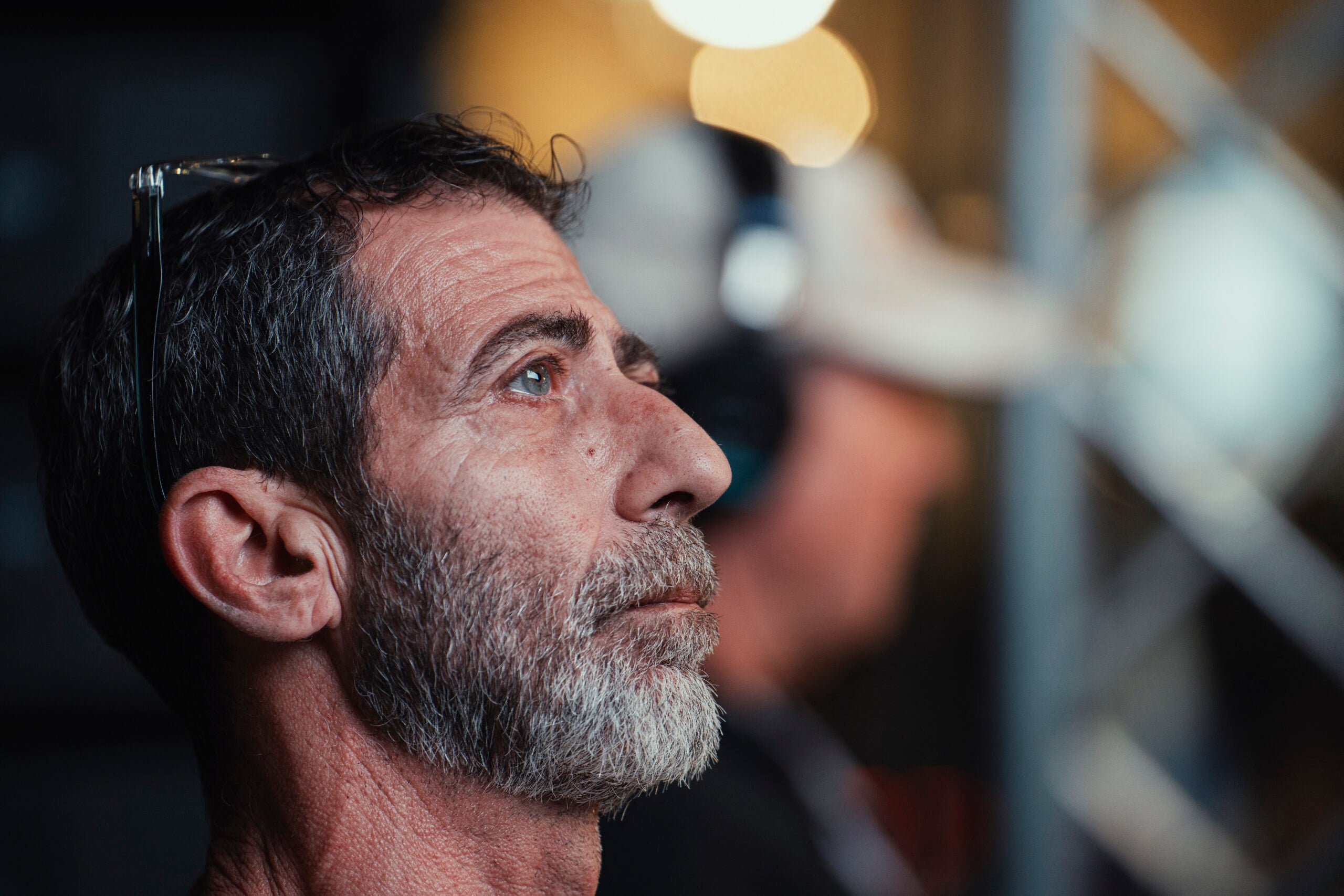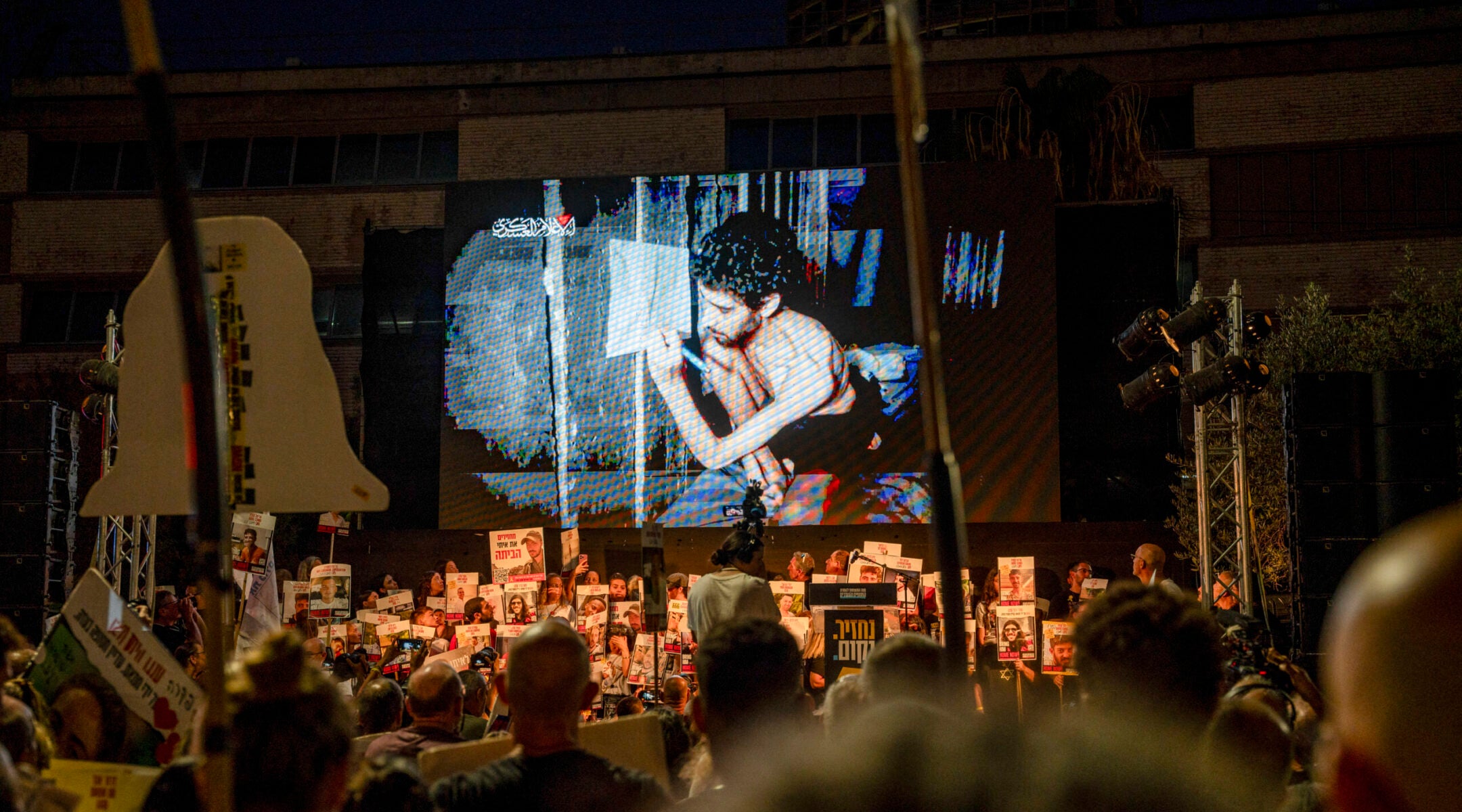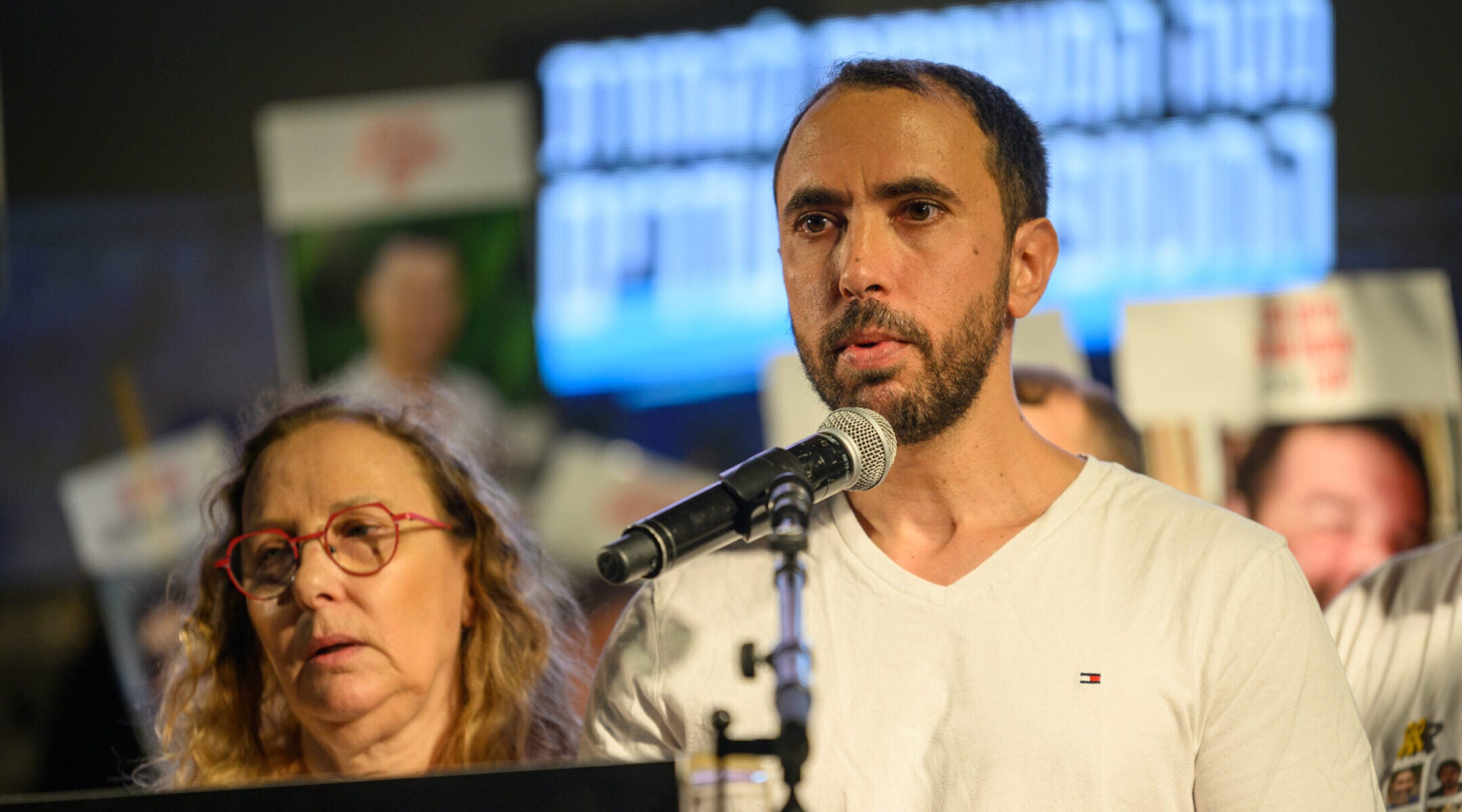Uncategorized
His son is due to be released from Gaza imminently. Ilan Dalal is grateful — and not just to Trump.

Hours before Monday’s expected hostage handover, Tal Shoham, who spent more than 500 days in Hamas captivity, and Ilan Dalal, father of hostage Guy Gilboa-Dalal — with whom Shoham was held — expressed gratitude to both President Donald Trump and, in a rare moment for hostage families, to the Israeli government.
“Thanks to President Trump for making the impossible possible,” Shoham said, alongside Gilboa-Dalal on a Zoom call with reporters.
Shoham said he was “allowing himself to hope” for the release of his fellow captives on Monday, but was also trying to block those feelings, “so I won’t break if it does not happen.”
He added his regret about not being invited to meet Trump. “I wanted to shake his hand and thank him — not only for this deal but for the deal that released me.”
Shoham was abducted from Kibbutz Beeri on Oct. 7 with his wife, two young children and other relatives. The women and children were freed in November 2023, and he was released in February this year.
Meanwhile, Ilan Dalal, whose son was taken hostage by Hamas terrorists from the Nova festival, said the first thing he would do when he encounters Guy after his release was “hug him, smell him and tell him that the nightmare is over.”
But he went on to say that didn’t know “what kind of son I’m going to get back,” citing the last video released of his son, in which he saw “despair in his eyes.”

An image of Evyatar David from a video released by Hamas is shown at a rally in Tel Aviv, Aug. 2, 2025. (Ori Aviram/Middle East Images via AFP/Getty Images)
“We saw him not the way we knew him. We know Guy as he was two years ago, but after he went through two years of suffering, of starvation, of humiliation, both physical and mental abuse, we don’t know how these things are going to affect him,” Dalal said. “I hope that he will not be so harmed that he cannot rebuild his life.”
Shoham spoke at length of his captivity saying that he was “intentionally starved … for sadistic psychological warfare” receiving between 200 and 300 calories a day to share with fellow hostages Guy and Evyatar David — also set to be released on Monday — first, “to make us suffer,” and second “to pressure Israeli society.”
He went on to say that his Hamas captors boasted about stealing humanitarian aid.
“I saw with my own eyes that they stole boxes and boxes and boxes of humanitarian aid from Egypt, from Turkey, from the Emirates, but they didn’t agree to give us any of this food in the tunnels,” he said.
But after the February release of Eli Sharabi, Or Levy and Ohad Ben Ami, all of whom were severely malnourished, his captors began giving “much, much more food,” he said, adding that it was dangerous because they were suffering from malnutrition. “It could have killed us.”

Israeli hostages stand on stage flanked by Hamas militants during the official handover in Gaza, Gaza Strip, on February 8, 2025. (Youssef Alzanoun / Middle East Images / Middle East Images via AFP)
Shoham said his time in captivity included “a lot of torture and cruelty.” Asked to describe one of the worst moments, Shoham declined, saying “disconnecting from the experience” helped him keep on fighting.
“I don’t want to go there,” he added.
Citing unnamed sources, Israel’s Channel 12 News on Sunday evening said the government has assessed that some of the living hostages set to be freed on Monday have undergone torture.
The Red Cross reported that it had seen some of the hostages and found some in serious condition, according to Israeli journalist Ronen Bergman.
Shoham described his captors as “so brainwashed and full of hate” but for some of them, it didn’t stem from religious motives.
“Some of them [were] religious, but some were only there because this is the popular thing to do. They can take all sadistic thoughts and actions not just against Israelis but also Gazans.” He recounted one incident he had witnessed, in which a Hamas operative shot a Gazan man in the knees because he “looked suspicious,” and later, when the injured man was being attended to by an ambulance, he was executed outright because “they decided that he should die.”
There were moments of humanity, he said — noting that Islam has rules for how to treat captives — but they were “very rare,” and cited instances in which his captors brought him smuggled food and a message from his wife.
He went on to say that most of them were “not soldiers.”
“One of the guards was a first-grade teacher, another was a lecturer at a university, and another was a doctor. These are normal people becoming terrorists,” he said.

Released hostage Tal Shoham speaks at the weekly “Bring Them Home” rally in Hostages Square on Oct. 11, 2025 in Tel Aviv. (Photo by Alexi Rosenfeld/Getty Images)
Captivity, Shoham said, “forced me to go inward.”
“Only a few people mattered to me — my family and a few close friends,” he said, adding that hearing of his wife and children’s release on the 50th day of their captivity was “tremendous” in helping him get through his ordeal.
The experience also intensified his faith. “I have a lot of gratitude for life. My faith in humanity and in God only increased. It is much more spiritual and religious than before.”
He credited the state with steady support once he came home. “I felt a lot of support from the government — I have a psychologist, financial support — anything that I needed was taken care of. I personally felt a lot of gratitude to my country in these days.”
Asked if he felt any misgivings towards the government for not securing a deal earlier, Ilan Dalal also struck a conciliatory tone.
“Of course we would have wanted it to be much earlier,” he said. “But the Israeli government also needs to think about the security of Israel. Probably there were a series of processes that needed to be completed before we got to this point.”
He described the psychological toll he and his family had suffered over the past two years. “Sometimes I woke up in great despair,” he said. “Sometimes I had no strength to get out of bed. But then I remembered my son in the tunnels. That he’s counting on us to be his voice. We didn’t have the option to break down.”
—
The post His son is due to be released from Gaza imminently. Ilan Dalal is grateful — and not just to Trump. appeared first on Jewish Telegraphic Agency.
Uncategorized
Iran and US Views on Sanctions Relief Differ, Iranian Official Tells Reuters

Iranian women walk past an anti-US billboard in Tehran, Iran, February 19, 2026. Photo: Majid Asgaripour/WANA (West Asia News Agency) via REUTERS
Iran and the United States have differing views over sanctions relief in talks to curb Tehran’s nuclear ambitions, a senior Iranian official told Reuters on Sunday, adding that new talks were planned in early March as fears of a military confrontation grow.
Iran and the US renewed negotiations earlier this month to tackle their decades-long dispute over Tehran’s nuclear program as the US builds up its military capability in the Middle East, fueling fears of a wider war.
Iran has threatened to strike US bases in the Middle East if it is attacked by US forces.
“The last round of talks showed that US ideas regarding the scope and mechanism of sanctions relief differ from Iran’s demands. Both sides need to reach a logical timetable for lifting sanctions,” the official said.
“This roadmap must be reasonable and based on mutual interests.”
Iran’s Foreign Minister Abbas Araqchi said on Friday that he expected to have a draft counterproposal ready within days, while US President Donald Trump said he was considering limited military strikes.
READINESS TO COMPROMISE
While rejecting a US demand for “zero enrichment” – a major sticking point in past negotiations – Tehran has signaled its readiness to compromise on its nuclear work.
Washington views enrichment inside Iran as a potential pathway to nuclear weapons. Iran denies seeking nuclear weapons and wants its right to enrich uranium to be recognized.
Washington has also demanded that Iran relinquish its stockpile of highly enriched uranium (HEU). The UN nuclear agency last year estimated that stockpile at more than 440 kg of uranium enriched to up to 60% fissile purity, a small step away from the 90% that is considered weapons grade.
The Iranian official said Tehran could seriously consider a combination of exporting part of its HEU stockpile, diluting the purity of its most highly enriched uranium and the establishment of a regional enrichment consortium in exchange for the recognition of Iran’s right to “peaceful nuclear enrichment.”
“The negotiations continue and the possibility of reaching an interim agreement exists,” he said.
BENEFITS FOR BOTH SIDES
Iranian authorities have said that a diplomatic solution delivers economic benefits for both Tehran and Washington.
“Within the economic package under negotiation, the United States has also been offered opportunities for serious investment and tangible economic interests in Iran’s oil industry,” the official said.
However, he said Tehran will not hand over control of its oil and mineral resources.
“Ultimately, the US can be an economic partner for Iran, nothing more. American companies can always participate as contractors in Iran’s oil and gas fields.”
Uncategorized
Mike Huckabee’s Comments to Tucker Carlson on Israel and Middle East Land Draw Condemnation in Region

Tucker Carlson speaks on first day of AmericaFest 2025 at the Phoenix Convention Center in Phoenix, Arizona, Dec. 18, 2025. Photo: Charles-McClintock Wilson/ZUMA Press Wire via Reuters Connect
Comments by US Ambassador to Israel Mike Huckabee suggesting that Israel had a biblical right to much of the Middle East drew condemnation over the weekend from countries across the region, who called his remarks “dangerous and inflammatory.”
Huckabee, an evangelical Christian, has been a staunch supporter of Israel throughout his political career and a longtime defender of Jewish settlements in the West Bank – land which the Palestinians seek for a state.
In an interview with Tucker Carlson that was conducted on Wednesday in Israel and aired on Friday, the populist US talk show host asked Huckabee about Israel’s right to exist and about Jewish roots in the ancient land.
Citing the book of Genesis, Carlson asked whether the modern state of Israel had a right to the lands promised in the Bible by God to Abraham, stretching from the Euphrates River to the Nile, covering much of the Middle East. In response, Huckabee said:
“It would be fine if they took it all. But I don’t think that’s what we’re talking about here today.”
Huckabee added: “We’re talking about this land that the state of Israel now lives in and wants to have peace in, they’re not trying to take over Jordan, they’re not trying to take over Syria, they’re not trying to take over Iraq or anywhere else. They want to protect their people.”
In response, a joint statement condemning Huckabee’s comments was issued by the Palestinians and countries in the Middle East and beyond, including Jordan, the United Arab Emirates, Saudi Arabia, Egypt, Turkey, Indonesia and Pakistan.
They said his comments were: “Dangerous and inflammatory remarks, which constitute a flagrant violation of the principles of international law and the Charter of the United Nations, and pose a grave threat to the security and stability of the region.”
A US Embassy spokesperson said Huckabee’s comments did not reflect any change in US policy and that his full remarks made clear that Israel has no desire to change its current boundaries.
Israeli officials did not immediately comment on the interview or the reaction from countries that signed the joint statement.
Uncategorized
Jack Hughes Makes History as 1st Jewish Male Athlete with Olympic ‘Golden Goal’

Milano Cortina 2026 Olympics – Ice Hockey – Men’s Gold Medal Game – Canada vs United States – Milano Santagiulia Ice Hockey Arena, Milan, Italy – February 22, 2026. Jack Hughes of United States scores their second goal in overtime to win gold. Photo: REUTERS/David W Cerny
i24 News – Jack Hughes made history on Sunday as the first hockey player widely recognized for both having a bar mitzvah and scoring an Olympic game-winning goal, leading the United States to its first men’s hockey gold medal since 1980.
The 24-year-old New Jersey Devils star from Orlando, Florida, scored early in sudden-death overtime to secure a 2-1 victory over Canada at the Milan Cortina Olympics. Hughes finished a cross-ice pass from teammate Zach Werenski, who had wrestled the puck from Canada’s Nathan MacKinnon.
“This is all about our country right now,” Hughes said. “I love the USA. I love my teammates. It’s unbelievable. The USA Hockey brotherhood is so strong.” Hughes also endured a high stick during the game, losing a couple of teeth but continuing to play.
The victory marked the first US win over Canada in a top-level men’s competition since the 1996 World Cup of Hockey. The win completed a US sweep of Olympic hockey gold, following the women’s 2-1 overtime victory against Canada on Thursday.
Hughes ended the tournament with three goals and three assists, contributing offensively even from a lower line. His older brother, Quinn Hughes, a Minnesota Wild defenseman, scored the US overtime winner against Sweden in the quarterfinals. Their parents, Jim and Ellen Hughes, were present for the celebrations.
Team USA also paid tribute to the late Johnny Gaudreau, who was killed in 2024 with his brother. Gaudreau’s jersey hung in the locker room throughout the tournament, and players carried it onto the ice after the medal ceremony. Two of Gaudreau’s children joined the team for commemorative photos.
Sunday’s match marked the third men’s Olympic gold medal game between the US and Canada, with Canada having won in 2002 and 2010. Hughes’ golden goal solidifies him as a historic figure in hockey, blending his Jewish heritage with Olympic triumph.


